
All categories
Featured selections
Trade Assurance
Buyer Central
Help Center
Get the app
Become a supplier

(78446 products available)







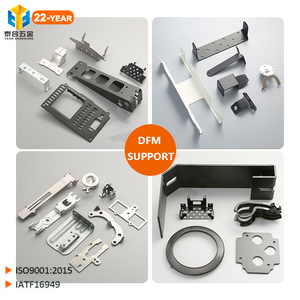



























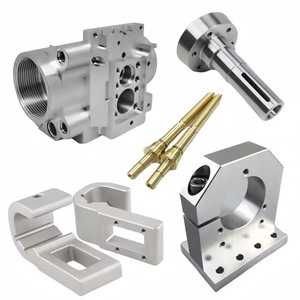

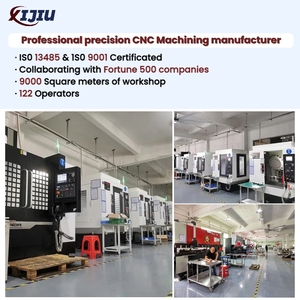

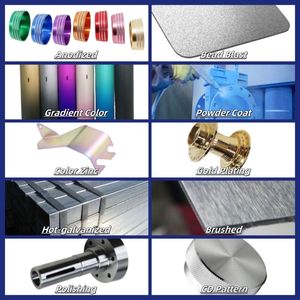




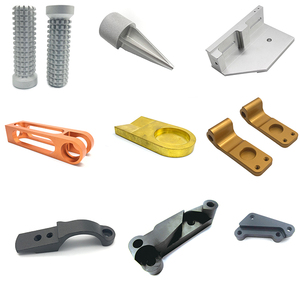

The selection of material for custom made metal parts is of paramount importance, dictated by the intended application and functional requirements of the part. No single material fits all scenarios; thus, a nuanced understanding of each material's properties is essential.
Steel
Steel, appreciated for its strength, durability, and versatility, constitutes one of the most prevalent materials for customized metal parts. Typically, steel alloys are utilized for profiling parts that have to bear extreme stress or pressure, for example, gears and structural components. Stainless steel, renowned for its corrosion resistance, also hedges the discipline where corrosion is problematic.
Aluminum
Custom-made aluminum parts are lightweight and resilient, making aluminum a superlative choice. Commonly, it is utilized in the production of parts for the auto sector, aviation, and electronics. Coupled with its resistance to oxidation and formation of a protective layer, aluminum is ideal for applications exposed to environmental elements. In addition, the workability of aluminum permits intricate custom designs, hence enhancing its attractiveness.
Copper
Copper, championing conductivity of electricity and heat, is frequently custom fabricated into parts like electrical connectors and heat exchangers. Although copper is heavier than most metals, its unparalleled physical properties often justify its use in high-tech applications. Moreover, copper's corrosion resistance contributes to its consideration in long-lasting applications.
Titanium
Custom metal parts made from titanium prove to be exceptionally strong, yet lightweight along with high resistance to heat and corrosion. Popular in the aerospace industry and medical implants, titanium comes in handy where reliability and strength are vital. Although more expensive than other metals, the long-term benefit offered by titanium often compensates for the initial investment.
Brass
Brass, a copper-zinc alloy, is easily recognized by its workability and resistance to corrosion properties. It is mainly used for making parts such as valves, musical instruments, and marine hardware. This alloy is also treated to provide excellent performance in situations exposed to moisture, making it a common fit for nautical applications.
Custom metal parts thrive in a variety of fields, which are formed to satisfy particular needs. In contrast to mass-produced components, custom-made parts ensure precision and adaptability. Normally, this makes them indispensable in negotiation.
Aerospace Industry
Custom metal parts occupy an important place in the aerospace industry. Here, they are manufactured to meet exacting dimensions and weight requirements. From airframe components to engine parts, customization ensures a perfect fit and enhanced performance. Usually, these parts are fabricated from high-strength materials like titanium or aluminum alloys, which are light yet extremely resilient.
Automotive Applications
In the automotive sector, custom metal parts deliver performance and aesthetic appeal in diverse applications. Be it for engine components, suspension systems, or exterior detailing, custom parts frequently assist in improving functionality. Sometimes, they are also manufactured to meet specific design requirements in order to accommodate unique vehicles or high-performance purposes. This enhancement contributes to better overall vehicle performance.
Medical Devices
Custom metal parts are crucial in medical device manufacturing. Certain components like surgical instruments and implants must meet stringent standards of safety and effectiveness. Typically, these parts are made from biocompatible materials such as stainless steel or titanium. These materials are often customized to offer precision and durability as well as an enhancement of the devices' overall efficacy.
Electronics
Custom metal components are used to make casings, connectors, and other parts in the electronics field. Normally, these parts are designed to suit particular dimensional and heat dissipation requirements. Conventionally, metals like copper and brass have better electrical conductivity. Customization also allows for incorporation of unique design elements, which, in turn, enhance product aesthetics.
Construction
Custom metal parts play a crucial role in the construction industry in order to address specific structural needs. Normally, they are utilized in making brackets, reinforcements, and custom fixtures. Often, these parts are fabricated to precise specifications to ensure structural integrity and stability. In addition, customization provides the flexibility to adapt to the unique designs of a project. This ability to fit specific design needs has great significance, particularly in modern architectural pursuits.
Selecting the appropriate custom-made metal parts can be challenging and require multiple factors to be considered. To make sure the parts meet a project’s needs, one will have to determine the application requirements, material compatibility, and more.
Application Requirements
One of the first things to do is to define the application of the custom metal parts. Different industries like auto, aerospace, electronics, and construction have specific standards. Knowing the precise function of the part in the project helps define the need in terms of strength, durability, and precision. Determining whether the part will perform at elevated temperatures, bear heavy loads, or perform in a corrosive medium is essential. This information helps with material selection.
Material Selection
Custom metal parts can be manufactured from a myriad of materials. These materials include stainless steel, titanium, aluminum, brass, and copper. Each of these materials has a unique property that makes it suitable for use in different applications. For instance, titanium is preferred for its combination of lightness and strength. Also, stainless steel is known for its resistance to oxidation. It is particularly ideal for use in settings prone to corrosion. Usually, the best material is one that meets both the performance and budget requirements.
Precision and Tolerance
Usually, precision is crucial in custom metal fabrication. Therefore, working with fabricators who can ensure tight tolerances is important. In applications like aerospace and auto, where even a small error can have adverse consequences, precision is indispensable. It is advisable to request information regarding the fabrication equipment and technology used by the fabricator. This measure guarantees the desired level of precision will be achieved.
Customization Capabilities
The custom fabrication shop's capabilities will need to be evaluated next. In this case, the part's design complexity and the shop's ability to fabricate it will need to be ascertained. Further, if the project requires unique designs or specific sizes, ensure the shop has the capacity to fulfill these requirements. Shops that provide a comprehensive range of machining services are more likely to manufacture versatile components.
Quality Assurance
Lastly, it is critical to ensure quality assurance in custom fabrication. Usually, reputable shops apply stringent quality control measures to guarantee their products' effectiveness and safety. Ask the shop about the quality standards and testing methods they use. This information helps avoid future problems.
A1: Ideally, custom metal parts are fabricated components manufactured based on specific dimensions and requirements. They are mainly used in distinct applications.
A2: Normally, custom metal parts are preferred because they are tailored to specific requirements. Therefore, they ensure better precision, quality, and performance. In addition, they provide unique solutions for specialized applications.
A3: Custom metal parts can be fabricated using varying materials. Some of the most common materials include stainless steel, aluminum, copper, brass, and titanium. Usually, each material has distinct advantages, thus making it suitable for particular applications.
A4: Yes, custom metal parts can be fabricated from materials like stainless steel and titanium. These materials have great resistance to corrosion, heat, and wear. Therefore, they can be used in extreme environments.
A5: Normally, custom metal part fabrication begins with a design phase. This phase is followed by material selection, machining, and assembly. The exact process mainly depends on the part's requirements.
A6: Typically, the cost-effectiveness of custom metal parts depends on the material and the complexity of the design. While they tend to be more costly than standardized components. Custom parts are capable of delivering better performance and a high level of precision. They provide value in specialized applications.